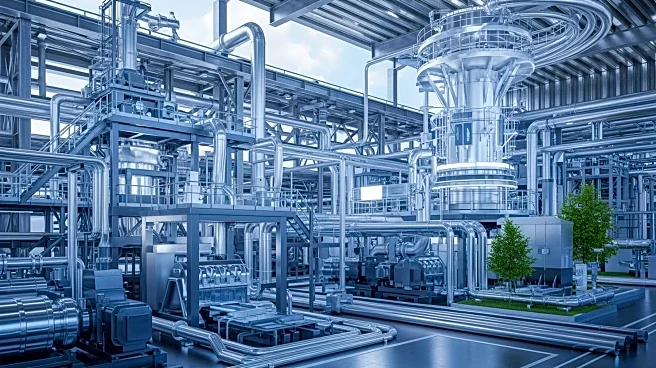What's Happening?
Vedanta Aluminium has announced the expansion of its low-carbon product portfolio with the production of Restora at its Balco plant in Korba, Chhattisgarh. This initiative is part of Vedanta's commitment
to achieving net-zero carbon emissions by 2050. Restora is manufactured using renewable energy and has a verified greenhouse gas emission intensity below 4 tonnes of carbon equivalent per tonne of aluminium, meeting global standards for low-carbon aluminium. The Jharsuguda smelter has been producing Restora since early 2022, and the Balco plant now offers Restora ingots, with plans to expand the product portfolio further. This development is aimed at strengthening Vedanta Aluminium's low-carbon footprint and catering to the growing demand for sustainable materials both in India and globally.
Why It's Important?
The production of low-carbon aluminium is crucial in the context of global efforts to reduce carbon emissions and combat climate change. By expanding its low-carbon product offerings, Vedanta Aluminium is positioning itself as a leader in sustainable manufacturing, which could enhance India's reputation as a hub for climate-conscious industrial growth. This move is likely to attract environmentally conscious investors and customers, potentially boosting the company's market share and profitability. Additionally, it aligns with global trends towards sustainability, which are increasingly influencing consumer preferences and regulatory policies.
What's Next?
Vedanta Aluminium plans to continue expanding its low-carbon product portfolio to meet evolving industry requirements. This could involve the introduction of new products and technologies that further reduce carbon emissions. The company may also seek partnerships or collaborations to enhance its sustainable manufacturing capabilities. As demand for low-carbon materials grows, Vedanta's strategic initiatives could lead to increased production capacity and market expansion, both domestically and internationally.
Beyond the Headlines
The shift towards low-carbon aluminium production reflects broader industry trends towards sustainability and environmental responsibility. This development could have long-term implications for the aluminium industry, potentially leading to increased regulatory scrutiny and the adoption of more stringent environmental standards. It also highlights the role of corporate responsibility in addressing climate change, as companies like Vedanta take proactive steps to reduce their environmental impact.










